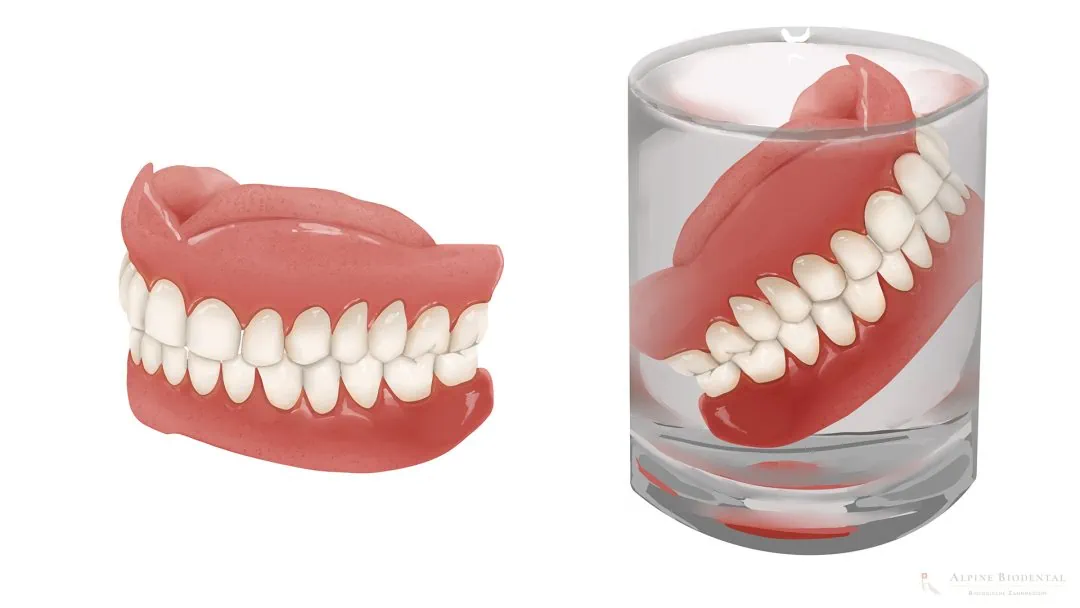Denture

A dental prosthesis is a removable dental replacement commonly referred to as “dentures”, “false teeth” or known as “third tooth”.Opting for dentures should be considered only in exceptional cases when a fixed restoration with ceramic implants is not possible.
Types of Dental Prostheses
There are different types of dental prostheses. The choice of prosthesis depends on the number and condition of the remaining teeth, as well as the patient’s preference for dental implants. Precise diagnostics and planning before starting treatment are crucial.
The various types include:
- Clasp Denture
- Telescopic Denture
- Complete Denture
Clasp Denture
This is the simplest form of denture. In this type, the prosthesis is secured to the remaining teeth using clasps and rests on the gums extensively. The prosthesis itself consists of a plastic base with metal clasps. However, it is also possible to make the clasps entirely from plastic.
Telescopic Denture
A telescopic denture is always preferable to a clasp denture and can be fitted onto individual teeth or dental implants. For better stabilization, ceramic implants can be added to provide enhanced support for the denture. At least 4 or 6 abutments are necessary for a telescopic denture on ceramic implants. For more information, please refer to All-on-4 and All-on-6.
Complete Denture
A complete denture is suitable for fully edentulous cases. In the absence of all teeth, an upper and lower complete denture can be fabricated. However, a fixed dental restoration on ceramic implants should always be preferred, as complete dentures come with various disadvantages.
Advantages of a Dental Prosthesis
A dental prosthesis should be considered only in exceptional cases when a fixed dental restoration on ceramic implants is not feasible. For a better, fixed option, please read about “All-on-8” and “Fixed Teeth in One Day“.
- Dental prostheses are cost-effective
- Surgeries can be avoided
- The prosthesis can be removed and easily cleaned
- If additional teeth are lost, the prosthesis can usually be extended, maintaining a cost-effective approach
Disadvantages of a Dental Prosthesis
Dental prostheses have several disadvantages compared to a fixed restoration on ceramic implants.
- Dental prostheses often feel like foreign objects and can cause uncomfortable pressure points
- Chewing function may be limited
- Occasional gag reflex is possible
- The use of denture adhesive can affect the sense of taste
- Individuals with dental prostheses may feel automatically older and may be perceived as less attractive
- If the prosthesis is supported by natural teeth, there is increased stress on these supporting teeth, leading to faster tooth loss
- Prostheses need regular relining due to continued bone resorption underneath, and without relining, the fit will decrease, unevenly loading the gums
- Since many teeth are missing, the corresponding meridians are not activated, which can have health consequences. Ceramic implants can trigger the meridians
- Time-consuming fabrication with multiple treatment sessions
Alternative to Dental Prosthesis
As alternatives to traditional dental prostheses, we recommend restorations with ceramic implants. Ideally, these restorations should be fixed. For more information, refer to “All-on-4“, “All-on-6“, and “All-on-8“. All-on-8 is the ideal restoration for long-term stability and health and should be preferred whenever possible.
Dr. med. dent. Tobias Steinherr M. Sc.
A denture has various disadvantages that you should be aware of. Feel free to contact us. We are here to help you.

Further information
Below are the relevant pieces of information listed to provide you with more insight into the topic.